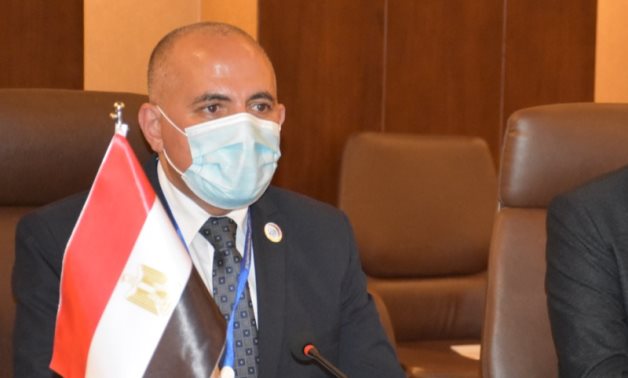CAIRO – 14 March 2021: During the 1st round of Baghdad International Water Conference, Egyptian Irrigation and Water Resources Minister Mohamed Abdel Atti reviewed Egypt’s water situation and the state’s 2050 strategy for realizing sustainability in water resources and securing needed water for the future.
“97 percent of Egypt's renewed water resources come from abroad,” the minister said adding that the country’s water sector is facing challenges of water shortage and growing population.
The 2050 national strategy aims to achieve sustainable management of water resources and a balance between limited water resources and the current and future water needs, he said, adding that the Ministry of Water Resources and Irrigation has also developed a plan for managing water resources until 2037 in cooperation with all relevant ministries, with investments at a cost of more than LE 900 billion.
Regarding the controversial Grand Ethiopian Renaissance Dam (GERD), Abdel-Atti said that Egypt is not against development in the Nile Basin countries, it is, however, against unilateral measures that do not take into consideration downstream the interests of countries.
Egypt and Sudan have voiced their concern about the possible harms and threats of the controversial Grand Ethiopian Renaissance Dam (GERD) and how the dam will negatively after their water share of the Nile in case Ethiopia abstained from signing a binding and legal agreement on the dam operation and filling its reservoir.
Early March, 2021, Egypt’s President Abdel Fattah El-Sisi made a one-day visit to Sudan, during which he and the Sudanese leaders have affirmed rejection to Ethiopia’s unilateral plans to implement the second phase of the GERD filling whether or not an agreement among the three countries is reached.
Ethiopia has frequently affirmed it would implement the second filling of the Grand Ethiopian Renaissance Dam next July under any circumstances.
Abdel-Atti has said previously hat Sudan worried because of what happened last year when Ethiopia began filling the dam reservoir without notifying Sudan, adding that Sudan was negatively affected.
In mid-July 2020, Ethiopian authorities unilaterally carried out the first phase of the filling process with 4.9 billion cubic meters; and it is expected that the second phase of the filling would reach 13 billion cubic meters in July.
The dispute among Egypt, Sudan, and Ethiopia dates back to May 2011 when Ethiopia started building the dam; Egypt voiced concern over its water share [55.5 billion cubic meters].
As Democratic Congo is chairing the AU for the year 2021, it is attempting to revive stalling negotiations between Egypt, Sudan, and Ethiopia. However, few hours before Sisi’s official visit to Sudan, Ethiopian Minister of Water, Irrigation and Energy Seleshi Bekele said on Thursday that his country is looking forward to a “win-win solution” for the Grand Ethiopian Renaissance Dam through trilateral negotiation.
Bekele’s remarks came after he hosted a delegation from the Democratic Republic of Congo to discuss the ongoing negotiations with Egypt and Sudan to reach a deal on GERD.
In 2015, the three countries signed the Declaration of Principles, per which the downstream countries should not be negatively affected by the construction of the dam.
In October 2019, Egypt blamed Addis Ababa for hindering a final agreement concerning a technical problem, calling for activating Article No. 10 of the Declaration of Principles, which stipulates that if the three countries could not find a solution to these disputes, they have to ask for mediation.
Washington had brokered tripartite negotiations among the three countries, in the presence of the President of the World Bank (WB) starting from November 6, 2019 until February 27 and 28, 2020.
During these rounds of talks, tangible outcomes were agreed on among the three parties concerning the rules and mechanism of operating the dam and the filling process of the reservoir during drought and prolonged drought; however, an agreement was not sealed.
Constructions in the Grand Renaissance Dam started on April 2, 2011 at a cost of $4.8 billion. The dam is located on the Blue Nile with a capacity of 74 billion cubic meters and is expected to generate up to 6,000 megawatts of power.

Comments
Leave a Comment